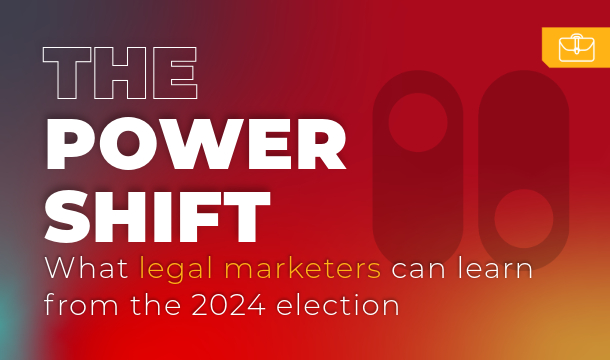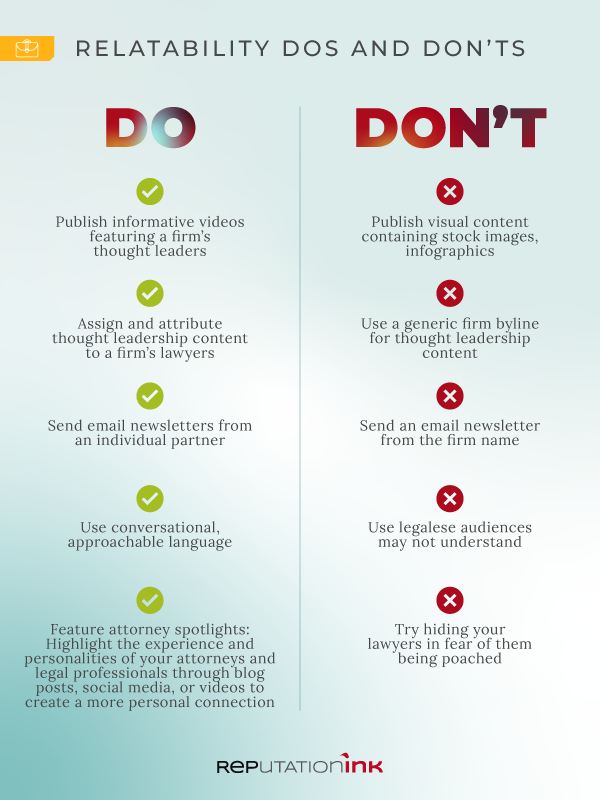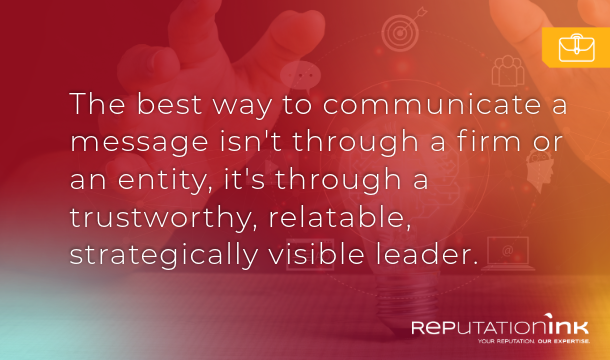The power shift: What legal marketers can learn from the 2024 election
The 2024 U.S. presidential election vividly illustrated a significant shift in media consumption and, more specifically, who people trust for information and news. For the first time in American history, presidential nominees and their running mates leveraged podcasts more than mainstream media to reach voters, reflecting broader changes in how younger generations access and engage with information.
This transformation is not limited to politics. It’s reshaping the legal landscape as well. Legal marketers who want to remain a trusted source for their audience need to pay attention to the media landscape shift and adapt their marketing and PR practices to become an “influencer” to reach their ideal clients.
Trust in traditional brands and mainstream media is waning
In America and in business, trust is currency. And these days, it seems traditional media gatekeepers are going broke. It’s a phenomenon that experts have dubbed the dispersion of authority.
Decades ago, millions of Americans would tune into the CBS Evening News each night for objective reporting, hanging on Walter Cronkite’s every word. Those days are gone. In the words of Mr. Cronkite: “And that’s the way it is.”
The mainstream media isn’t the only entity plagued by trust issues. Sales Factory recently released its latest Consumer Pulse Report, which demonstrates trust in government institutions and big companies continues to decline across all generations.
Source: Sales Factory’s 2024 Consumer Pulse Report
While television news remains the primary source of information for many Americans, consuming nearly two hours of political news per week, there’s a notable shift towards digital platforms, according to the report.
Source: Sales Factory’s 2024 Consumer Pulse Report
In short, social media, podcasts, and niche content creators are gaining prominence, especially among younger demographics.
Relatability is the new X factor
Relatability is persuasive. It requires being perceptive enough to identify and connect with individuals on your shared values and ideas. It can’t be done without listening to them and making them feel like they matter. Ultimately, that’s what everyone wants to feel: that they matter and that they belong. Demonstrating relatability in your brand positioning is the marketing equivalent of whispering in their ear: “I hear you. I see you. I am you.”
Audiences are no longer depending on mainstream media to act as a fact checker and determine the news agenda. Instead, they’re increasingly turning to specialized podcasts, email newsletters, and industry-specific forums for niche information that reinforces their own views. This change is driven by a desire for more relatable, personalized content delivered by “someone like me” rather than traditional institutions.
Gen Z, in particular, is 58% more likely to consume political information on social media than on TV. This trend is mirrored in the 2024 election cycle strategies of the presidential candidates, with both sides leveraging social media and alternative platforms to reach voters. For instance, VP Kamala Harris incorporated memes into her campaign (ahem, brat summer and coconut trees), while former President Trump participated in a two-hour interview on X with Elon Musk.
The consumer world reflects the wider changes we’re experiencing in the legal sector. To respond to these shifts, law firms must stop relying on their institutional brand and legacy to sell their services and involve their attorneys more, positioning them as influencers.
The rise of influencers
During the 2024 election cycle, Trump appeared on several high-profile podcasts like The Joe Rogan Experience, the country’s biggest podcast. Trump’s Rogan appearance was published on YouTube, where it has over 46 million views. The ad equivalency (the amount the Trump campaign would have had to pay to reach 46 million voters) alone made it an impactful, strategic decision. Similarly, to appeal to women voters, Harris visited SiriusXM’s Call Her Daddy, the most-listened-to podcast by women, to discuss key campaign issues.
Both of these shows have one thing in common: they’re hosted by powerful influencers. In 2024, Alex Cooper left Spotify and inked a three-year deal with SiriusXM worth $125 million, becoming the highest-paid (and most listened-to) female podcaster in the world. Perhaps the only podcaster with more influence than Cooper is Rogan, whose reach is unquestionable.
You can roll your eyes all you want at the rise of influencers, but they have consistently demonstrated their ability to drive significant return on investment (ROI) for brands, with 66% of brands now claiming that creator content drives a higher ROI than traditional digital advertising. That’s largely because 92% of consumers trust peer recommendations over traditional advertising.
Dispersion of authority implications for legal marketing
We’ve established that who people trust today is different than previous generations, and relatability is now twice as important as popularity. However, the one attribute more compelling to today’s audiences than relatability is expertise, according to the 2024 Edelman Trust Barometer Global Report. Law firms have this in spades.
Just as consumers are increasingly leaning on influencers as their primary news source, law firms should lean more heavily on their attorneys to demonstrate their particular expertise and build credibility. After all, a law firm will never be as relatable to humans as another human being.
The best way to communicate a message isn’t through a firm or an entity, it’s through a trustworthy, relatable, strategically visible leader.
Here are six practical ways to become a legal authority:
- Humanize your firm: Put your people front and center. Potential clients want to engage with real individuals, not faceless firms. Identify your thought leaders and empower them to create solid, credible content. Those individuals don’t have to be practice group chairs. Cast your net wider to include other partners, especially those identified in the firm’s succession plans as future leaders.
- Leverage expertise: You can’t be friendly and relatable without the expertise. Develop and showcase deep knowledge in your field, and you will break through the legal marketing noise.
- Produce original research: Offering unique insights and backing them up with definitive data can set you apart and establish true authority in your key practice areas. If you’re providing something that can’t be found anywhere else, you’ll get a client’s attention.
- Embrace multiple channels: Recognize that your audience may be starting their information journey from various places, not just Google. Email newsletters, LinkedIn, and industry forums are all viable channels for disseminating information.
- Focus on utility: Create content that genuinely helps your audience solve problems or gain valuable insights. Brainstorm your client’s greatest challenges, and then demonstrate how your lawyers can solve them.
- Cultivate trust: Understand that trust is no longer a given. It must be earned and maintained through consistent, valuable engagement. Establish a cadence for generating and publishing segmented newsletters, blogs, and other informative content so that you’re always top of mind when it comes time for your audience to make their purchasing decisions.
The future of legal marketing
Law firm marketing will likely continue to mirror trends from the consumer world. The demand for instant gratification, personalized experiences, and relatable content will only grow. Firms that can adapt to these changes, leveraging their human capital and experience while providing unique, valuable insights, will thrive in this new landscape.
Remember, in the era of information overload, it’s not just about being heard — it’s about being trusted. By focusing on authenticity, experience, and genuine value, law firm marketers can build trust and position themselves as industry influencers.
If you’re not sure how to become a trusted legal authority, Reputation Ink has you covered. Contact us at info@rep-ink.com to learn how we can help.










